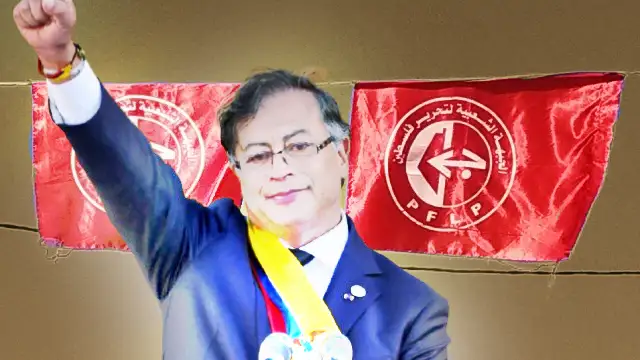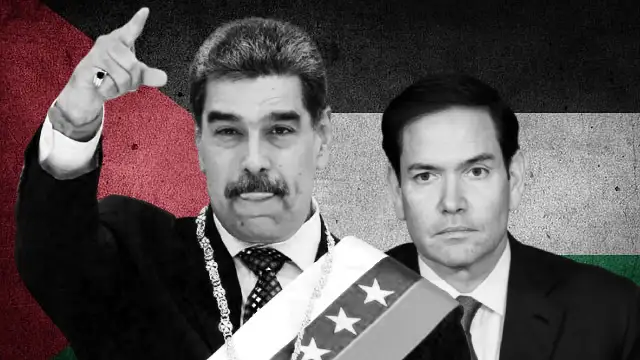The Popular Front for the Liberation of Palestine (PFLP) has strongly condemned Colombian President Gustavo Petro’s visa revocation by the US after he participated in a pro-Palestinian demonstration. A Latin America-based PFLP official said the organisation condemns Mr Petro’s visa revocation as state terrorism targeting voices that challenge American foreign policy.
Petro’s visa revocation ‘imperialist response‘
Abu Shams, the PFLP representative in Latin America, described Mr Petro’s visa revocation as “one of the tools of organised state terrorism practised by American imperialism against courageous and bold voices.” The PFLP condemns Mr Petro’s visa revocation following his call to form a “salvation army to liberate Palestine.”
The US government announced on Friday it would revoke Mr Petro’s visa after he joined pro-Palestinian demonstrators in New York. The Colombian president had urged US soldiers to disobey President Donald Trump‘s orders during his appearance.
“Revoking Petro’s visa will not silence the voice of freedom, and his call to form a salvation army to liberate Palestine is a turning point in global discourse,” the PFLP representative said.
Mr Shams praised Mr Petro’s address to the UN General Assembly, describing it as “a turning point in global political discourse.” The PFLP representative characterised the speech as pointing “the finger at the wound of the fascist-Zionist imperialist alliance that controls major interests and ignores the blood of oppressed peoples.”
PFLP links Petro’s stance to revolutionary legacy
The Palestinian organisation connected Mr Petro’s positions to historical revolutionary leaders. Mr Shams emphasised “common intellectual lines” between the Colombian president’s speech and addresses by Che Guevara and Fidel Castro.
The PFLP representative described Mr Petro’s stance as “the embodiment of courage and clarity in defending Palestinian and humanitarian rights.” He noted that the Colombian president “stood at the head of a massive march and chanted with the Palestinian people and called once again for the formation of an army to save the world.”
Mr Shams argued that Mr Petro’s position “was not merely rhetorical words or electoral slogans, but rather a humanitarian, moral, and political stance that exposes the alliances of oppression and domination.” The PFLP representative criticised the United Nations and international law for failing “to protect civilians and stop the massacres in Gaza.”
The left-wing Palestinian organisation identified three interconnected themes in Mr Petro’s speech: “the arrogance of the white man, the American imperialist alliance with the forces of fascist-Zionist capital, and the legitimisation of violence in the name of ‘security’ and false ‘democracy’.”
Colombian president challenges US drug war narrative
Mr Shams detailed Mr Petro’s criticism of the US’s practices during his New York address. “America constantly lies and describes the peoples of the South as drug traffickers, while the Trump administration’s advisors to Latin America and the Caribbean are partners of drug lords, and the epicentre of the global drug trade is Washington itself,” the PFLP representative quoted.
The Palestinian organisation highlighted Mr Petro’s exposure of “the role of American influence as a key partner in the massacre and genocide in Gaza.” Mr Shams emphasised that the Colombian president revealed US support for “military operations targeting children, women, and the elderly.”
The PFLP representative argued that Mr Petro’s speech “neutralised old terms” and reminded the world that imperialism turns humanity into “a feral monster that bombs children mercilessly.”
PFLP endorses call for international military force
The Palestinian organisation expressed strong support for Mr Petro’s proposal to form a global military force. Mr Shams noted that the Colombian president’s call for “a global military force to liberate Palestine and stop the genocide” aligns with the PFLP’s strategy.
“This call constitutes a strategic step in practical solidarity with Palestine,” Mr Shams said. “It requires genuine Arab and regional support to transform from rhetoric into deterrent action on the ground,” he added.
The PFLP representative emphasised that Mr Petro’s statement that “condemnation and denunciation are not sufficient to confront the crimes committed by the Zionist entity in Palestine” reflects the Marxist-Leninist organisation’s position. Mr Shams argued that “the traditional diplomatic solution is useless in Palestine, because the enemy only understands the language of force.”
The Palestinian organisation warned that “any delay or silence will keep the initiative confined to screens and the media.”
Petro’s visa revocation reveals Washington’s threat recognition
Mr Shams characterised the visa revocation as evidence of American concern about Mr Petro’s influence.
“The US visa revocation of the Colombian president is nothing more than Washington’s recognition of the seriousness of Petro’s speech and his transgression of all the restrictions it has tried to impose on countries around the world,” he said.
The PFLP representative argued that Mr Petro spoke “on behalf of all the free and oppressed in the world.” He contrasted this with US policy that “gives immunity to war criminals like Netanyahu who boast of massacres and destruction.”
This comparison, according to Mr Shams, reveals “the depth of the contradiction and danger in American policy.”
PFLP proposes UN reform as solution
The Palestinian organisation outlined institutional changes needed to address the current international crises. Mr Shams emphasised that the PFLP calls for “reassessing the role of the United Nations and reforming its mechanisms.”
Specific reforms include amending the veto system, which the organisation argues prevents resolutions that would halt genocidal crimes. The PFLP representative pointed to “the need for serious discussions on relocating UN headquarters or establishing alternative mechanisms that respect international law and enforce genuine accountability.”
Mr Shams noted that implementing such changes requires “international will and people exerting political and diplomatic pressure on decision-making centres.”
The PFLP’s slamming of Mr Petro’s visa revocation resonates with the similar left-wing stance taken by the Latin American countries that are daring the US, including Brazil, Cuba and Venezuela. By extending support to Mr Petro, amid his visa revocation controversy, the PFLP not only exhibited its international stance but also strengthened its alliance with the left-wing forces in Latin America that have historically supported Palestinian liberation.
Join our channels on Telegram and WhatsApp to receive geopolitical updates, videos and more.


